Living
How to stay friends for 50 years? Ask the women of Sugar Hill.
The Washington Post February 12, 2024
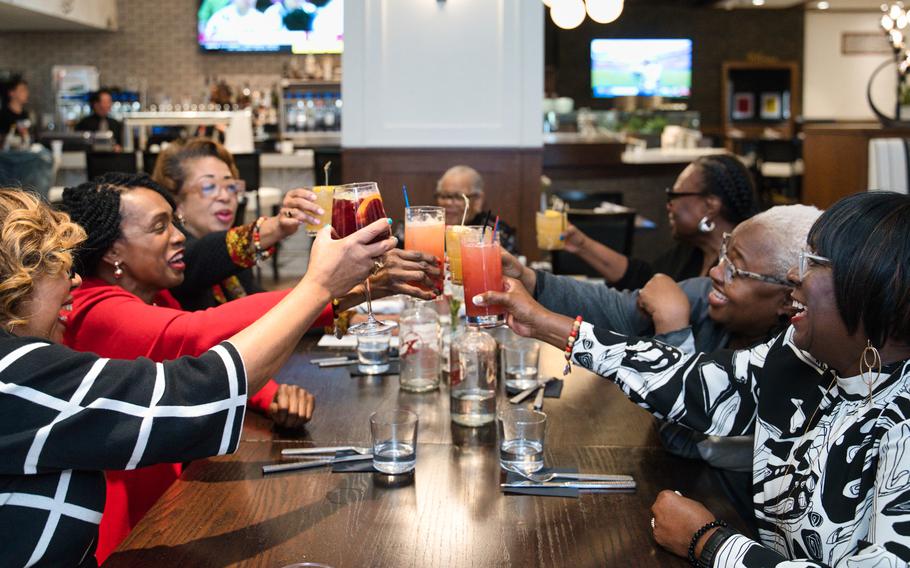
For the past 50 years, the Sugar Hill Sisterhood has continued to meet at least once a year for dinners, weekend sleepovers and vacations around the world. (David Carter/For The Washington Post)
They got ready for parties and shared countless laughs as freshmen inside the cramped rooms of Elkton Hall, a high-rise dormitory at the University of Maryland, College Park. They bonded over being Black women at a university where, in 1971, Black students made up only 4% of the student body.
Friends dubbed the tightknit group of young women “Sugar Hill,” and the name stuck.
“It was unique for that many African American females to be in one place,” said Elizabeth Gholston, 71, one of the early members of the group who now resides in Northwest Washington. “During that time, you needed that kind of camaraderie and cohesiveness.”
On Dec. 14, 1973, the women, most of them college seniors, gathered to celebrate a birthday and an early graduation. But it wasn’t the end of the friend group. Before the evening was over, they had decided that the group should meet again in December the following year. They never imagined where the new tradition would take them.
For the past 50 years, the women have continued to meet at least once a year for dinners, weekend sleepovers and vacations around the world. The Sugar Hill Sisterhood, as they now call themselves, has expanded to 16 women who have leaned on one another through five decades of milestones — weddings and graduations, baby showers and funerals.
There’s no challenge too big for the sisterhood, said Everene Johnson-Turner, 71, who now lives in Columbia, Md., and attended the first December dinner.
“I could call in the troops in a minute,” she said. “They would be there for me.”
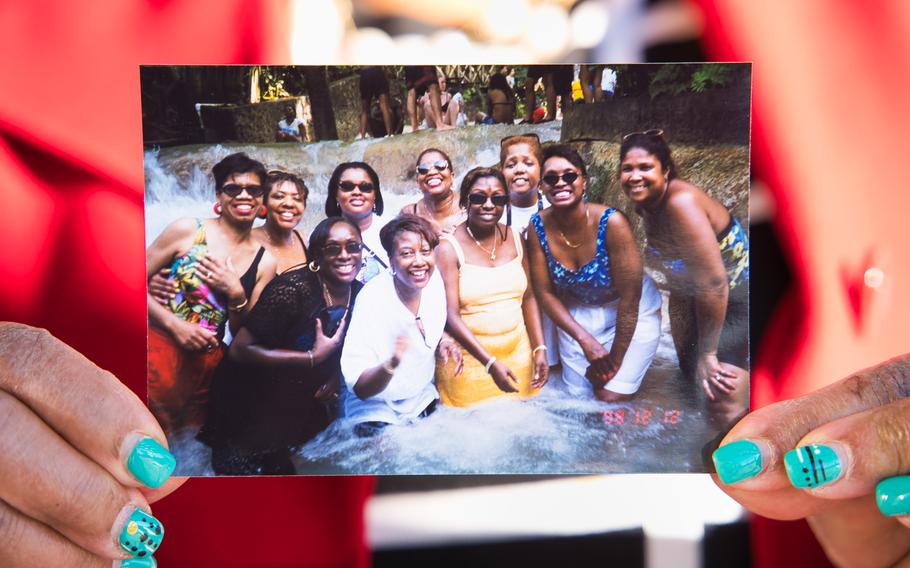
Joyce Wynn Dawkins holds a photo showing some of the Sugar Hill women. The group has been on adventures around the world. (David Carter/For The Washington Post)
Lasting friendships and traditions
The enduring nature of female friendship has been well documented. Research shows that female friendships tend to be deeper than those of men, and women are more likely to rely on friends in addition to their spouses for support, said Marisa Franco, an assistant clinical professor at the University of Maryland and author of “Platonic: How the Science of Attachment Can Help You Make — and Keep — Friends.”
While many people have friendships that span decades, the women of Sugar Hill are something of a case study in what it takes to maintain them. Although the bond among the women of Sugar Hill was forged during their college years, they say they have worked hard to stay connected and nurture their relationships. A daily WhatsApp group chat helps them stay in touch, as do phone calls, video chats and remote group activities like a 90-day fitness challenge. They are committed to their annual reunions and have maintained unwavering support for one another.
“The character of all the women in this group is top-notch,” said Jonetta Hill, 71, who now lives in the Virgin Islands. “People are in awe that all these women in all these years, we haven’t had a fight, we haven’t had a breakup or anything like that. We respect each other’s individuality.”
While the Sugar Hill reunions began with annual dinners, they later evolved to overnight stays at one another’s houses and then trips together around the world. The women say that whatever is going on in their lives, they can look forward to spending time with the Sugar Hill Sisterhood every December.
The Sugar Hill Sisterhood has toured the world together, with trips to Jamaica, Spain, Italy, the Bahamas, Mexico, the United Arab Emirates, Brazil, Argentina and Portugal, among many other places. In December, the group marked the 50th anniversary of the December reunions with a trip to Grenada.
“These trips are meaningful because for a lot of years that was the only vacation I had,” said Cassandra Stewart, a 71-year-old who lives in Baltimore. “We have the best time ever, and it really sets the tone for my year. When I’m with them, it’s going to be nothing but good times.”
To make sure the trips and reunions keep happening, the group each year designates someone who is responsible for selecting the location, figuring out the transportation and planning the activities. That person can organize the trip by themselves or in a committee with a few other women. Hosts are selected based on a rotation, and before the reunion is over, it is determined who will plan the following year. Once the destination is decided, there are no complaints.
“It’s an unspoken agreement to not say anything discouraging about the choice of location,” said Linda Evans Cheek, 72, of Hyattsville, Md., who also lived in Elkton Hall during her college years. “If you want to go somewhere when it’s your turn, we’ll go there.”
The reunion coordinator will send a notice in mid-March or early April about the destination of the trip along with an estimate of the total cost, said Joyce Wynn Dawkins, 71, a former Elkton Hall resident who lives in Laurel, Md. Planning ahead is part of the fun.
“The really key thing I loved about it was the excitement that nobody knew what they were going to do until the invitations went out,” Dawkins said.
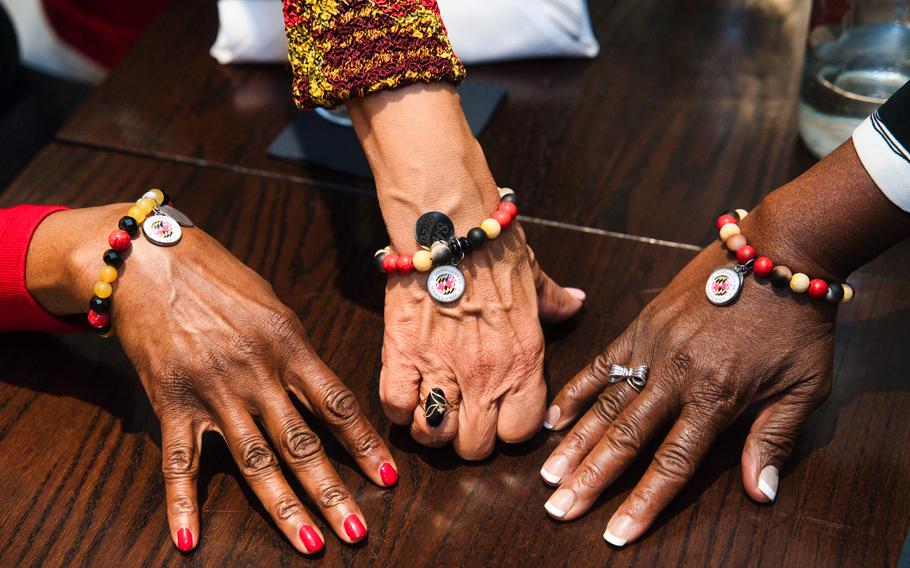
The women in the Sugar Hill Sisterhood bonded in part because they were all Black women on a campus where Black students made up only 4% of the student body. (David Carter/For The Washington Post)
A daily group chat
The daily group chat is lively and eclectic. Messages include prayers, inspirational quotes and life updates, Dawkins said. “Time and friends are two things that become more valuable, the older you get,” read one message.
When it’s someone’s birthday, the group chat is filled with GIFs, emojis and well wishes. If the women ever need to have a deeper conversation, they will jump on a video call, like they did on Fridays during the height of the COVID-19 pandemic.
And if someone in the group mentions she isn’t feeling well, she knows she will hear from the others.
Helen Jackson James, a 71-year-old resident of Columbia, Md., recently experienced a throbbing headache and mentioned it to Quentess Elizabeth Davis of D.C., whom she has known since middle school. The two, along with Novella Jones Sherman of Mitchellville, Md., originally became part of the Sugar Hill Sisterhood while they were students who commuted to the University of Maryland campus.
Almost immediately after complaining about her headache, James started receiving concerned texts and calls from other women in the group.
“They were on top of me, asking: ‘Did you go to the doctor? Did you go to the emergency room?’” said James, who later got a head scan and a clean bill of health. “They help me maintain my health and positive mind. We give each other strength, and when there’s something challenging for us, we try to lift that person up.”
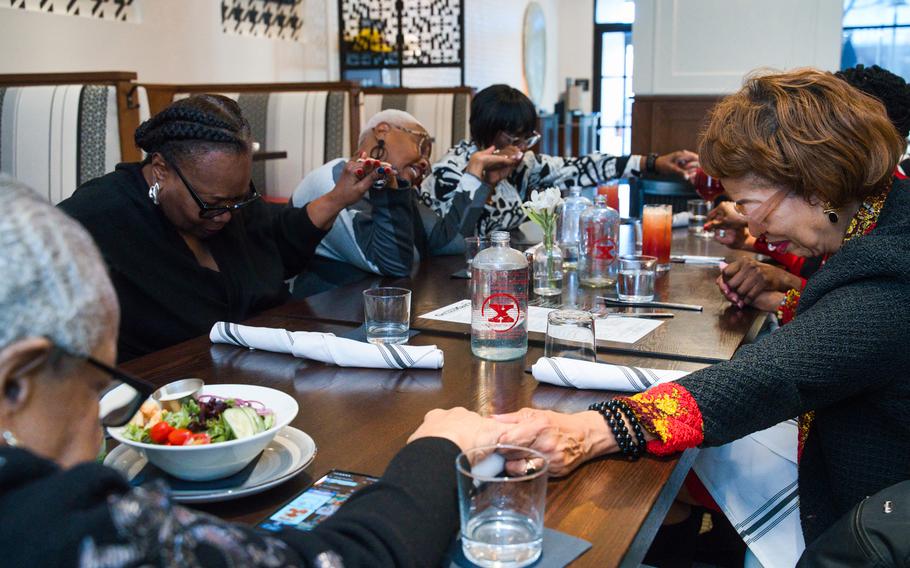
The Sugar Hill women have leaned on one another through five decades of milestones, including weddings, graduations, baby showers and funerals. (David Carter/For The Washington Post)
Support during good times and bad
In the late 1970s, Dawkins’s boyfriend died in a car accident. She had moved back to Baltimore and was mourning the loss when one of the Sugar Hill sisters, Sheila Perkins-Hawkes, persuaded Dawkins to come back to D.C. and live in an apartment with her. They stayed roommates for the next few years.
“She nurtured my soul,” Dawkins said. “That’s all I can say. She let me cry when I wanted to cry.”
Stewart, a Baltimore native, befriended most of the women through Dawkins, whom she met in high school. The sisterhood was there for Stewart at her lowest moment nearly 40 years ago when the nonprofit where she worked closed its doors. She was without permanent employment for two years, and her friends in the sisterhood sent her cards, covered her dinners and even helped pay for her to attend the reunion trip that year.
“That meant the absolute world to me,” Stewart said. “I don’t remember ever being that low in my life. It was just how they kept me encouraged. They just made me feel good about myself at a time where I didn’t have that at all. I don’t have any biological sisters — I have all brothers — but I don’t think I could’ve picked a better group of sisters.”
Perkins-Hawkes, 71, a native of D.C. who grew up with several friends in the group, said she has leaned on the friend group to get through everything from “bad boyfriend breakups” to “my joys, my sadness, times when I’ve fallen and needed to be picked up.”
And they can count on her for the same support.
“If you call me up and you need me, I’m coming,” she said.
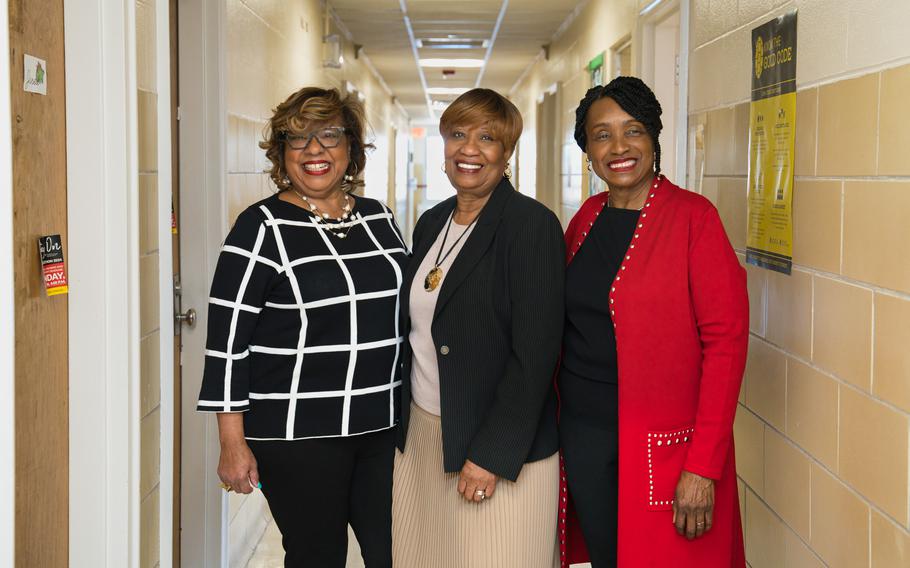
From left, Joyce Wynn Dawkins, Linda Evans Cheek and Elizabeth Gholston visit the inside of Elkton Hall at the University of Maryland, College Park, earlier this month for the first time since the 1970s. (David Carter/For The Washington Post)
A lasting identity
The group continues to debate the origins of their name. Several said they believe it was started by male friends on campus. “Sugar” was a term of endearment toward the women, while “hill” referred to the fact that they lived on the top floor of Elkton Hall.
“It was all girls, and we were supposed to be all sweet sisters,” said Angie Page, 71, of Ellicott City, Md. “Sugar is sweet and we were young ladies up there.”
Group members say their name has become part of their identity and now extends to family members. Husbands are referred to as “sugar daddies,” Johnson-Turner said. Children are “sugar babies,” and grandchildren are “sweet tarts.”
“Everything we call our families have to do with sugar,” Johnson-Turner said.
The Sugar Hill friendships now span generations. The friends support one another’s children and grandchildren, and the children of the sisterhood also spend time together.
“It’s a great feeling knowing that we’ve passed the Sugar Hill legacy to our offspring and they are passing it down to their offspring,” Dawkins said.
And when Dawkins got married in 1985, Cheek’s husband explained to her fiancé that his commitment extended beyond his fiancée.
“Just make sure you want to do this,” Dawkins recalls him saying at the time. “You’re marrying her, but you’re marrying 15 other sisters as well.”
“He was laughing,” Dawkins said, “but he was right.”